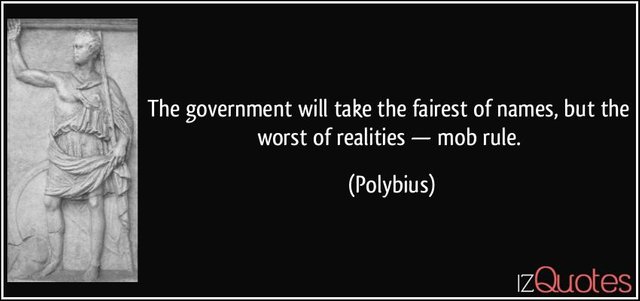Disease that is democracy
In the “Republic,” Plato describes the political arrangement known as democracy as being the worst form of government. If the state can be likened to a ship, he writes, then in a democracy, the captain of the vessel is chosen, not by his ability to navigate the seas, but by his capacity to garner popularity. Furthermore, those who are most proficient at navigation, because they use much of their time observing the stars, the tides, and the wind, are marginalised and ignored by the lay sailors, who bewitched by the populist demagogues, commit their lives and their ship to the whims of hucksters. The reality of democracy, however, is far worse than the farce the fictional analogy attempts to portray. The pernicious influence of a poorly considered political arrangement, based upon flawed and false assumptions, is widespread sociocultural disintegration.
All representative governments assert their authority upon the legitimacy derived from the “consent” of those governed. Such assertions establish a political perception, in which the governed believe that it is they who hold authority, and not the government. This belief in “popular authority” leads the subjects to perceive their governors as their servants, the laws as guidelines, and their whims as political edicts. These flawed beliefs lead to the curious phenomena, in which the most ignorant feel entitled to dictate to their betters on matters of public policy, of which they have remain entirely ignorant. Thus, the West witnesses thoughtless teenagers demanding racial suicide in “extinction rebellions,” unlettered students commanding university administrators regarding campus policies, the financially illiterate demanding sweeping socioeconomic transitions, etc. In short, the delusion of “popular authority” have effected a sociocultural matrix, in which the least qualified exercise inordinate influence in shaping public policy.
Furthermore, the frequent election cycles of the Western democratic governments have resulted in public policy horizons of impossibly short timespan. With potential for loss of majority in parliament ever present threat, political parties channel their energies to effecting short-term gains, even at the expense of long-term harm. After all, benefits of long-term public policy will only advantage the political party in power at the time of maturation, which may not be the current political party in power. In addition, because the voting rabble only remember grand gestures fondly, elected officials tend towards policies and actions that generate ever-increasing political spectacle. Thus, there is an inexhaustible demand for disseminating controversy and discontent among the voting rabble by the political operatives that borders on addiction. Without controversy and discontent, there exists little motivation in the public for either a change in government, or the continual support for the current government. The democratic government seemingly functions from one crisis to another, dumping enormous resources into solving manufactured problems, while existing infrastructure and bureaucracy crumble silently from neglect. Traditions and customs that have been successful in maintaining a cohesive society inevitably becomes the fodder for the populist whores seeking new controversy and new discontents, upon which to capitalise. Gradual, but inexorable, eroding of sociocultural norms, for new populist assent eventually results in the loss of any and all moral reference frame, and all values of the society devolves into calculating popular polls regarding social issues.
As success in a democratic social system becomes increasingly identified with popularity and popular assent, the promising talents naturally coalesce towards pursuing activities that primarily generate popularity and fame. With all the native talents occupied in chasing empty platitudes of the ignorant masses, the more critical but less visible stations of the society must increasingly and necessarily be filled by an imported work force or a large immigrant population. The inevitable sociocultural friction between the natives and the mass imports becomes fodder for the next cycle of controversy and discontent that the political class uses to garner votes. A democratic society that has jettisoned all traditions and customs, as the current iteration of Western democracies have evolved into, naturally disintegrates into sociocultural fragmentation. Allowed to continue, such sociocultural fragmentation results in balkanisation of society into islands of competing ethnic enclaves. Even faced with imminent sociocultural dissolution, the democrat is unable to formulate any rational policy, so dependent he is upon the opinions of the ignorant rabble. The obvious policy response would be that of the reactionary xenophobia against the unassimilated immigrants; yet, such measures result in inevitable socioeconomic collapse, as the critical stations of the society become denuded of competent professionals. Reclaiming the lost traditions and values from which their society developed is an impossibility within the sociopolitical matrix of democracy, in which zeroes equate their whims as natural law. Decoupling the society from the flawed political institution of democracy becomes the only path in preserving some semblance of sociocultural cohesion.
Plato prophesied that all democracies end in tyranny. It may be that tyranny is the only political solution to the disease that is democracy.
